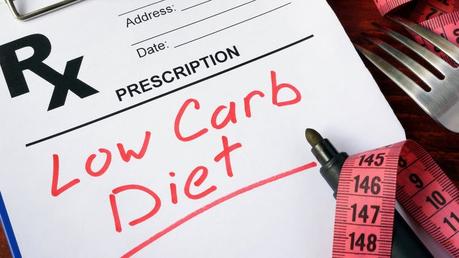
In 2019, a conventional diabetes diet - providing between 60-90 grams of carbs at meals and 15-30 grams of carbs at snacks - is no longer considered state-of-the-art.
Earlier this year, after decades of recommending a low-fat, high-carb approach, the American Diabetes Association (ADA) published a consensus report stating that "reducing overall carbohydrate intake for individuals with diabetes has demonstrated the most evidence for improving glycemia (blood sugar)."
And just recently, a lower-carb diet was found to be more effective than a conventional diabetes diet for decreasing blood sugar and liver fat in people with type 2 diabetes:
Diabetologia: A carbohydrate-reduced high-protein diet improves HbA1c and liver fat content in weight stable participants with type 2 diabetes: a randomised controlled trialIn this study, 30 adults with type 2 diabetes were randomly assigned to eat either a carb-reduced diet, high-protein diet or a conventional diabetes diet for six weeks. Then for the next six weeks, each group switched to the other diet. Of note, these diets provided enough calories to intentionally maintain weight rather than promote weight loss. In addition, the carb-reduced diet still averaged 175 grams of carbohydrate per day, compared to about 300 grams per day on the conventional diet.
Before and after each six-week diet period, researchers tested the participants' hemoglobin A1c (HbA1c) levels and several other metabolic health markers.
Their findings? In the 28 people that completed the study, the lower-carb, high-protein diet:
- decreased hemoglobin HbA1c by 0.6%, compared to only 0.1% for the conventional diabetes diet
- decreased fasting blood sugar by 12.8 mg/dL (0.71 mmol/l), compared to a slight increase for the conventional diabetes diet
- decreased liver fat by 2.4%, compared to a slight increase for the conventional diabetes diet
Additionally, researchers reported that people's blood sugar levels increased nearly 60% more after eating a conventional diabetes diet test meal versus a lower-carb test meal.
Now, these results reflect the group averages rather than individual results. The conventional diet didn't increase fasting blood sugar and liver fat in everyone. However, all of the participants experienced reductions in both of these markers in response to the reduced-carb diet.
This study shows that even a modest reduction in carbs can be beneficial for people with diabetes - and perhaps inspire them to cut back even more to further improve their blood sugar control and liver health.


